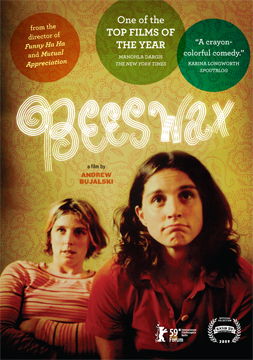| BEESWAX
an essay by kevin corrigan In one scene, Corinne (Katy O’Connor), an employee of Storyville Boutique, asks her boss Jeannie (Tilly Hatcher) if she can put flyers in the window of the store, announcing a rally in support of “equal marriage rights.” Jeannie gives her consent, but then asks Corinne if this is the type of rally where people can get arrested. Corinne says it’s not, and explains that the only time she’s ever been arrested at a political rally was when she “planned on being arrested.” Jeannie presses Corinne on the issue, but Corinne is unwavering. Recognizing this, Jeannie finally lets it go. She gives Corinne her blessing. Additionally, she tells Corinne that she trusts her. Grateful, Corinne assures Jeannie that she won’t be arrested or miss her shift at the store. “I think I can be both punctual and righteous,” says Corinne. Just imagine for a second that Beeswax was “America’s #1 movie” instead of, say, Couples Retreat. (Just supposing.) It’s not a comedy, but it is, at times, delightfully, wickedly funny. What would the world have to be like for Beeswax to gross hundreds of millions of dollars? Perhaps there’s an alternate universe where Jerry Brown won the presidency, where Buddhist economics prevailed, and movies like Beeswax went on to represent the way most people felt, dominating the popular culture. And maybe it is antithetical for humanist ideals, or movies that represent them, to find mass audiences. Supposing then Beeswax were a TV series, would people find it as compelling as “Survivor”? Okay, it is a 100 minute feature, not a TV series. It is an art film (gahh!!), but it is about average people. And it’s as real, if not more real than any reality TV show I’ve ever seen. I know what “reality tv” is supposed to mean, but when I hear the term, I always think of the documentary form. Is it incorrect to presume that documentary filmmaking paved the way for reality TV? To me, reality programming is Michael Moore, is Michael Apted’s UP series (documentary films that follow the lives of fourteen British children since 1964, when they were seven years old). Or the Maysles Brothers (Salesman, Grey Gardens). Or Marcel Ophuls (Hotel Terminus). Or the films of Frederick Wiseman, specifically the documentary Central Park, where you are let in on a public meeting in Manhattan’s Central Park, in which community issues and matters of policy are discussed by real people. (Think "Parks and Recreation"?) Another favorite scene is between Jeannie and a woman who is giving her legal advice. Jeannie wants to know if it’s at all feasible to claim that she was taken advantage of in a contract she co-signed with her partner, Amanda. The woman (Betty Blackwell) tells her that, unfortunately she, Jeannie, seems too intelligent to have been swindled, therefore she cannot help Jeannie. I felt like I was watching Harlan County, USA. At the same time, I thought of the scene in Goodfellas where Ray Liotta gives himself up to the Witness Protection Program, where Ed MacDonald, a real-life Fed, plays himself. One wonders if Betty Blackwell is playing herself. The people in Beeswax are for real.It’s no secret that Bujalski’s films are populated with “non-actors”...Is it that these nonactors secretly know how to act? Or is it that Bujalski has what Cassavetes had? A knack for identifying actor-savants most likely to blossom under his watch? Every single person in Beeswax is so individually interesting and specific and play off each other so well, it’s hard to know how much of it is them, and how much of it is Bujalski guiding them. The performances are so seemingly candid, and yet it does not come off like improvisation. You feel the characters’ motives. You feel their underlying passion. Far more important than the style of the film, however, is the underlying theme of Beeswax, which is love. It is about people going to bat for each other, and going all the way. The expressions of love in this film hit home. There is a scene where Lauren (Maggie Hatcher) stops by her mother’s house for dinner. The embrace they share at the top of that scene is remarkably sincere. They hold on to each other for that extra moment. When Lauren breaks up with Scott (David Zellner), she tells him she only feels “half way” committed to the relationship. Scott intimates that that is okay with him. Lauren then says “maybe we should try breaking up” and Scott berates her for being “half-assed” about it. But it is Scott who is okay with Lauren being only “half” into him. You get the feeling that it is Scott’s complacency that Lauren wants to break away from. You sense that when Lauren really loves someone, she loves them with all her might, even carries them, the way she literally carries her sister Jeannie (and Jeannie’s wheelchair) in one scene. The way Merrill (Alex Karpovsky) tools around in Jeannie’s wheelchair while discussing her problems with her...the amount of feeling implied in the way he moves the wheels of the chair...seems to suggest that he would trade places with her if he could. Every time I watch this movie, it makes me wonder what I would do if I were the characters. It reminds me how much I love the people in my own life and how much I would do for them. It makes me want to hug them as tight as I can and tell them how awesome they are. ----- Kevin Corrigan is an actor. He has appeared in over 60 feature films, including Goodfellas, Walking and Talking, Buffalo '66, and Pineapple Express. |



